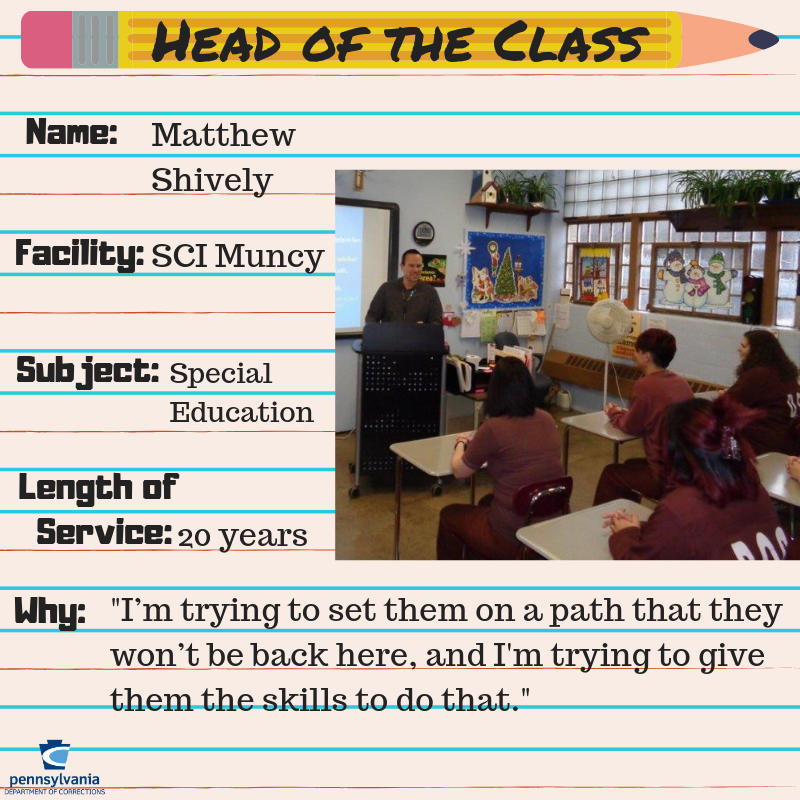 Matthew Shively is a versatile asset to the SCI Muncy education department.
Matthew Shively is a versatile asset to the SCI Muncy education department.
Shively teaches ESL (language skills), social studies (world geography and U.S. government), and science (biology, chemistry and physical science) at Adult Basic Education and General Education Development levels. But his main subject is one that may surprise people: special education.
"We follow the same state and federal regulations as public schools," Shively said. "We just have to make things adaptable for this environment.
"We have to make the best of the services we have available. We also coordinate occupational or physical therapy."
His special education students are working on their high school diplomas, and his class can range in size from 2-20 students. His students' conditions can be as diverse as in public school, including dual diagnosis developmental disabilities, intellectual disabilities, severe emotional disabilities and being on the autism spectrum—a condition he sees becoming more prevalent.
They can also be gifted.
"I have one gifted student right now actually," Shively said. "A gifted person gets more challenging questions and more challenging curriculum. Keeping them interested is difficult."
Before Muncy, Shively worked at Selinsgrove Center, an institutional setting for people with severe mental health and developmental disabilities. He came to Muncy to teach special education when the previous teacher was retiring. But when he arrived, the previous teacher changed his mind, so Shively served as a corrections counselor 2 for nearly 3 years. When the position did open, he became the special education teacher fully.
He also has taught ESL from the beginning, since he speaks Spanish.
"I had that inner desire to go somewhere I could truly make a difference," Shively said. "Education in the correctional setting is probably more crucial than public school. In public school, you want them prepared for life, but these ladies need to be prepared for a second try.
"I'm trying to set them on a path that they won't be back here and I'm trying give them the skills to do that."
The biggest hurdles he faces are the lack of access to outside services such as job fairs, community experiences, and internet usage that is available in public schools.
It is also more difficult setting up real-world experience for them. Outside he could have them shadow a nurse or somebody if they're interested in a career, but they can't do that inside the facility.
Instead, Shively uses technology.
"I use a lot of video resources, hands-on projects, just to try to get the experience as real as possible," he said. "For biology, we have virtual dissections. They use a smart board pen that serves as the scalpel. It's improvisation."
When he started, Shively remembers using a chalkboard and safety pens. Now he has students who have never seen a chalkboard, and he uses handheld computers for his lessons to make it easier to ask questions.
"They can push a button on their computer so I know when they need help," he said. "They don't have to speak up and think they're stupid or being called out. I can reiterate what concept I'm on a little more without singling anyone out."
Empowering and enabling his students for a brighter future is a driving motivator for Shively, but unfortunately teachers at DOC facilities rarely see the fruits of their labor. Contact between teacher and student is forbidden when the student is released, so most leave and are never heard from again.
But recently, a chance encounter created a special moment for Shively.
When out in public, "this person comes running up to me saying 'Mr. Shively!' And I knew it was an inmate because nobody calls me that outside of here."
"She's crying and she thanked me," Shively said, "and said after she got her diploma she went to school and got her teacher's certification and minority business woman's loan and started her own salon. Now she owns 5 salons in the area and bought her house. She said, 'I really feel like it was you got me back on track and doing something positive with my life.'
"That was the moment where it all sunk in that maybe I am making a difference. It may be all or half, but some of them are doing well from what knowledge and skills I've given them here."